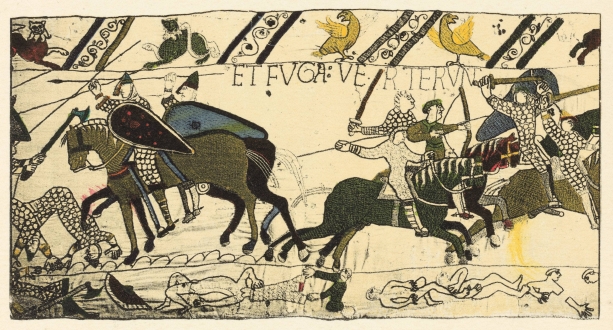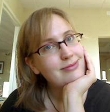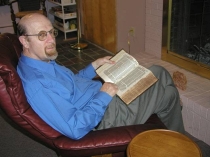BOOKS
Alum's collaboration with professor results in book on medieval vengeance

A battle scene from the 11th century Bayeux tapestry, from a facsimile in "The Book of the Bayeux Tapestry."
In July 2005, Susanna Throop '00 looked out over a session she'd organized at the International Medieval Congress in the United Kingdom to find the room overflowing with people. "Gosh, maybe there's something here," she thought.
Five years later, that "something" became "Vengeance in the Middle Ages: Emotion, Religion and Feud" (Ashgate Publishing), a book she co-edited with Cornell professor of history Paul Hyams.

Susanna Throop '00 See larger image
The collaboration between the two editors has a special poignancy since Throop, an assistant professor of history at Ursinus College, became a medievalist because of Hyams. She had been planning to double major in English and biology when she took a survey class with Hyams. "I was just totally gripped. And that was that," she says.
Hyams' approach to teaching history intrigued her – especially the way he emphasized the unanswered questions and the role of the historian as investigator, not just someone recording the past or commenting on facts. And she liked that there were so many unanswered questions still to be examined in the Middle Ages.
"My time at Cornell shaped my life. Having professors like Paul made me want to teach and support young people in the same way I was supported," she says.
Throop says the book project wouldn't have happened without Hyams' input. Hyams tells the story a little differently. "The book project was all her," he says. "And she had the good sense to draw in a number of younger scholars from the U.S., England and France."
According to Throop, her relationship to Hyams changed irrevocably from mentee to colleague when he asked for feedback on the chapter he'd written for their book – and she gave it to him. Suddenly, she wasn't a student anymore, but an equal.
While the book is aimed at medieval scholars, its exploration of the history of emotion and the justification of human conflict make it accessible to a wide audience. Essays in the book cover such themes as the heroic cultures of vengeance, Christian justification and expression of vengeance, and vengeance as a legal and political tool. The book is unusual, says Hyams, for its cosmopolitan, trans-Atlantic mix of historians and literary scholars.

Professor Paul Hyams See larger image
When Hyams spoke recently to Throop's students at Ursinus, "It was like a love fest," he says with obvious pride. "The students adore her. That happens with young teachers, but the faculty seemed to really like her as well."
For Throop, studying the Middle Ages is like a distorted mirror that shows you looking back at yourself. "One of the things that I always have in mind with the Crusades is that a lot of people thought they were doing something good," she says. "I still remember when I was an undergrad and it hit me: People can have good intentions, be motivated by their consciences and do horrible things. That's the conundrum that continues to be relevant. And the more we deal with the complexity of human relationships in the past, it becomes easier – or at least more obvious – to see it in the present."
Throop received a Ph.D. in history in 2006 from the University of Cambridge, where she was a Gates Cambridge Scholar from 2001 to 2005. Her first monograph, "Crusading as an Act of Vengeance," is forthcoming.
Linda B. Glaser is a staff writer for the College of Arts and Sciences.